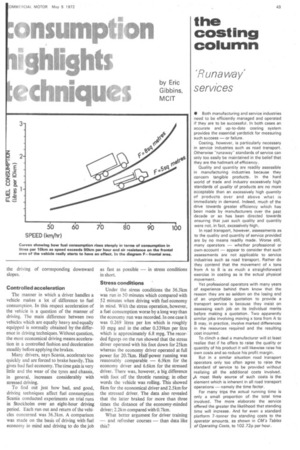the costing column
Page 45

If you've noticed an error in this article please click here to report it so we can fix it.
'Runaway' services
• Both manufacturing and service industries need to be efficiently managed and operated if they are to be successful. In both cases an accurate and up-to-date costing system provides the essential yardstick for measuring such success — or failure.
Costing, however, is particularly necessary in service industries such as road transport. Otherwise "runaway" standards of service can only too easily be maintained in the belief that they are the hallmark of efficiency.
Quality and quantity are readily assessible in manufacturing industries because they concern tangible products. In the hard world of trade and industry excesSively high standards of quality of products are no more acceptable than an excessively high quantity of products over and above what is immediately in demand. Indeed, much of the drive towards greater efficiency which has been made by manufacturers over the past decade or so has been directed towards ensuring that just such quality and quantity were not, in fact, excessively high.
In road transport, however, assessments as to the quality and quantity of service provided are by no means readily made. Worse still, many operators — whether professional or own-account — appear to consider that such assessments are not applicable to service industries such as road transport. Rather do they contend that the movement of x tons from A to B is as much a straightforward exercise in costing as is the actual physical movement.
Yet professional operators with many years of experience behind them know that the reason they are so seldom on the losing end of an unprofitable quotation to provide a transport service is because they insist on assessing each job on its individual merits before making a quotation. Two apparently similar jobs involving moving x tons from A to B may, in practice, involve marked differences in the resources required and the resulting cost incurred.
To clinch a deal a manufacturer will at least realize that if he offers to raise the quality or quantity of his product it will likewise raise his awn costs and so reduce his profit margin.
But in a similar situation road transport operators only too often agree to raise the standard of service to be provided without realizing all the additional costs involved. ,A most likely source of such costs is the element which is inherent in all road transport operations — namely the time factor.
For many trips the actual running time is only a small proportion of the total time involved. The more elaborate the service offered the greater the likelihood that standing time will increase. And for even a standard platform 7-tonner the standing costs to the operator amounts, as shown in CM's Tables of Operating Costs, to 102.72p per hour.




























































































